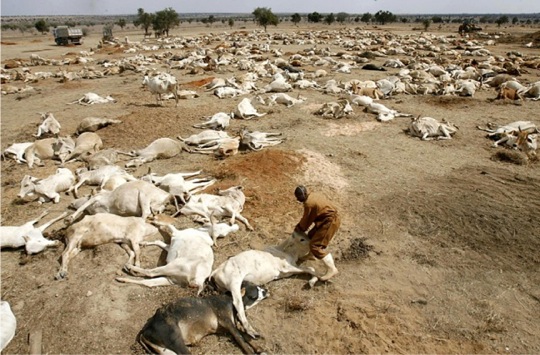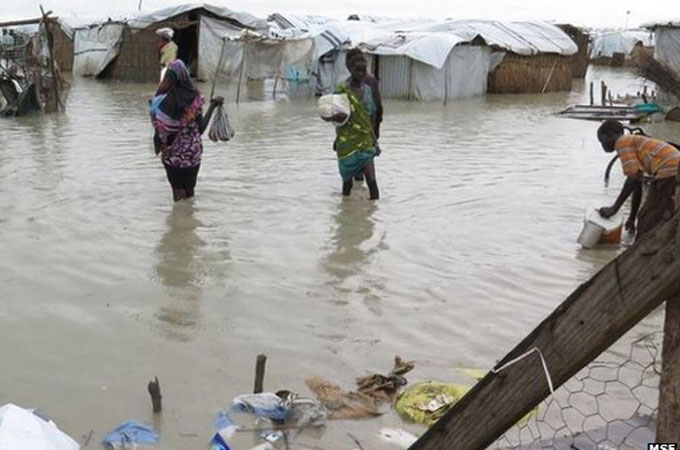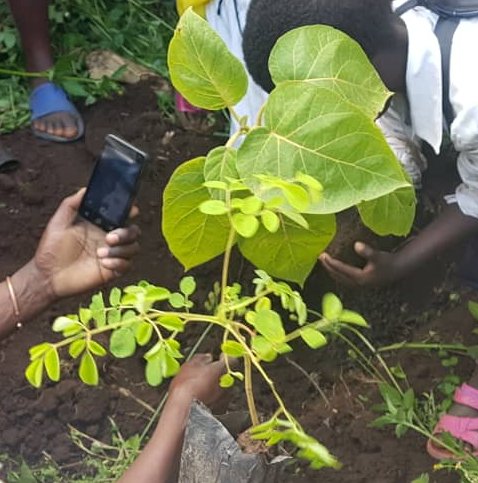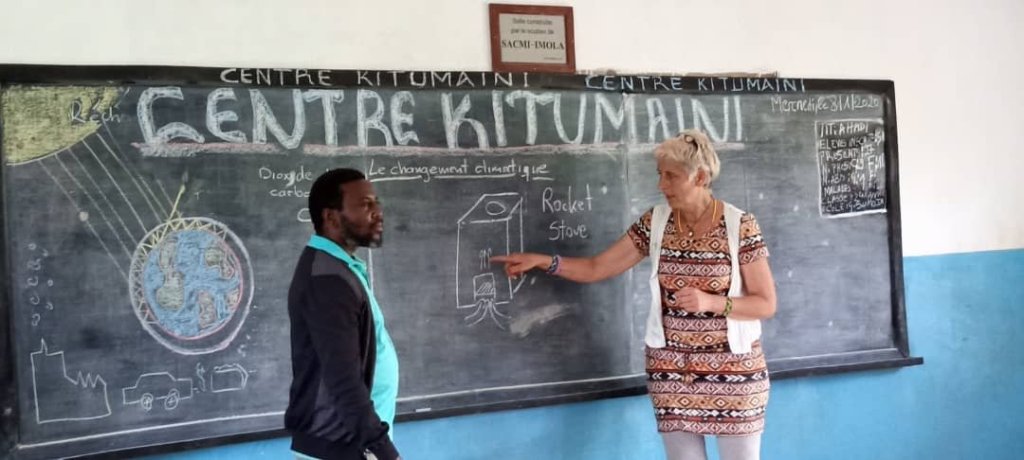The story of the center
The Centre Kitumaini was created in 2002 as a project for multilated women. During the war time it was commun praxis to rape the women, often even very agressivly. The women and the children out of the mutilation are moreover often outcasted by their community. The first aim was to get the women treated in a specific hospital. There is only one in Bukavu with 200 places.
Another problem here in Congo is, that the women often carry much to much. There are still few vehicles and it´s mostly the women, who carry heavy loads of firewood, water, wood, vegetables and whatever needs to be transported. They get raptures like hernia inguinalis.
In 2016 a school “Umoja” was created for the outcasted children in Kavumu. Injured Women are employed as teachers or care takers for the children. The school provides 6 times per week a porridge with maize, soja and sugar. The school is funded by donnors. It is possible to get a godparenthood for 150§ per child per year to pay school fees, books, pens, school uniforme et medical care. There are already 75 sponsorships.
Another project is fighting the malnutrition of the children in Miti, Katana. 35 children from 6 months to 10 years are getting a rich porridge 6 times a week. Its a mixture of soja, maize, groundnut and milkpowder and sugar.
The mothers have gotten fields to farm and help to cultivate a bigger variety of legumes than usual. The center has a demonstration site, were they show the women how to farm in harmony with nature.
The main field of action of the center is their microfinancing bank. 3500 people already got a credit. The credit has to be under the umbrella to fight climate change like
-protection against erosion
-promoting plants for the change of season, like sorghum
-avoid the use of charbon
-afforestation
-nourishement of the soil.
Climate change talk with the children
We start with the Greenhouse Effect. How does it work, by what is it caused?We look at the effects of Global Warming for Africa.
 A Somali refugee girl on a donkey fleeing the Somali capital due to hunger, to a refugee camp, in Mogadishu, Somalia, Wednesday, May 7, 2014. Aid groups in Somalia are warning that seasonal rains are failing and mass hunger could again descend on the country. The U.N.’s food and security unit says 51,000 children are severely malnourished and are at high risk of death. Aid groups said Wednesday that despite such a grim number only 12 per cent of the needed aid funds in 2014 have been met. Aid groups say an additional (Canadian) $822 million is needed. (AP Photo/Farah Abdi Warsameh)
A Somali refugee girl on a donkey fleeing the Somali capital due to hunger, to a refugee camp, in Mogadishu, Somalia, Wednesday, May 7, 2014. Aid groups in Somalia are warning that seasonal rains are failing and mass hunger could again descend on the country. The U.N.’s food and security unit says 51,000 children are severely malnourished and are at high risk of death. Aid groups said Wednesday that despite such a grim number only 12 per cent of the needed aid funds in 2014 have been met. Aid groups say an additional (Canadian) $822 million is needed. (AP Photo/Farah Abdi Warsameh)
 The global warming causes changes in rain and dry seasons, droughts, floods, increases of diseases and displacement of people.
The global warming causes changes in rain and dry seasons, droughts, floods, increases of diseases and displacement of people.
 We discuss the situation in eastern Congo. We see here too, the seasons are no longer predictible. Just now the dry season should have started already, but its still raining. And it rains so heavly, that erosions killed 12 people in Bukavu last week.
We discuss the situation in eastern Congo. We see here too, the seasons are no longer predictible. Just now the dry season should have started already, but its still raining. And it rains so heavly, that erosions killed 12 people in Bukavu last week.
The solutions
 The children propose to plant trees. A lot of trees have been cut to provide farmland and charcoal, but have not been replaced. We discuss the benefits of trees and how to plant them.
The children propose to plant trees. A lot of trees have been cut to provide farmland and charcoal, but have not been replaced. We discuss the benefits of trees and how to plant them.
Trees are good to construct houses and furnishment, they provide firewood, they produce oxygen, they give as fruits and nuts, shade and they fight erosion.

We plant Senna, Moringa, Tomato Tree , Grevelia and passion fruits.
Climate Talk with the women
The next day we perform a day with 24 representatives of the 3000 women of the Centre Kitumaini. Others join in, so at all we are 30 persons. We start by building a Rocket Stove to avoid the cutting of grown trees for making charcoal, so we can directly use to cook our lunch on it.
A Rocket Stove uses only little sticks, which you can collect under trees. Another possibility is to plant quickly growing trees, like all types of Acacia and Senna, so you can harvest branches. There are lots of different designs of Rocket Stoves, but they all have an extra entry for air, a chimney and an isolation. We continue with informations about Global Warming and its effects for Africa. We talk also about the impacts of Kapitalism, Monoculture and Plastic Pollution. The women are very interested in local solutions and upcycling.
Further cooperation
We decide to create a cooperation: The representatives will construct a Rocket Stove at their homes, get experience with it and promote it under the 3000 women of the Centre Kitumaini. I´ll help with funding and knowledge. We start directly with a model.
Philomene has already started to build a rain shelter. We smooth the earth under the Rocket Stove to get a good fundament. Nadine and  Olivier work on the mud. Earth, clay, cow dung, cutted grass and water are mixed and kneaded to create a good mud. We start with the downer level, which will provide the air supply. We have bought construction iron and cut it to create a grid, on which the fire will be burning. Two irons are the bridge to hold the brickes for the entree. We use 36 brickes to construct the chimney. At the end we pug the mud and polish the surface. Now the oven has to dry for at least two weeks, so the mud will
Olivier work on the mud. Earth, clay, cow dung, cutted grass and water are mixed and kneaded to create a good mud. We start with the downer level, which will provide the air supply. We have bought construction iron and cut it to create a grid, on which the fire will be burning. Two irons are the bridge to hold the brickes for the entree. We use 36 brickes to construct the chimney. At the end we pug the mud and polish the surface. Now the oven has to dry for at least two weeks, so the mud will
not crack.
NOTE: Individuals of many cultures, nationalities, religions, and beliefs are actively involved with Farmers Dialogue The shared articles and/or commentaries represent the views of the writer and not necessarily those of Farmers Dialogue as a whole.
Originally published by: smarti2013
On 29 January 2020



